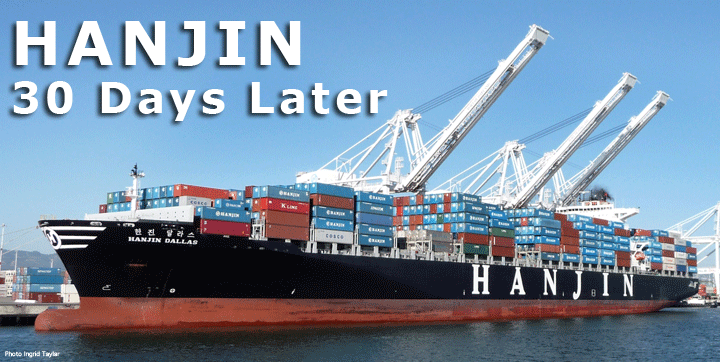 The
Hanjin bankruptcy has resulted in financial hardship
for many companies and caused turmoil and time delays
throughout the supply chain. The
Hanjin bankruptcy has resulted in financial hardship
for many companies and caused turmoil and time delays
throughout the supply chain.
On August 31, Hanjin
Shipping announced it had filed for bankruptcy. It is
the largest bankruptcy in the shipping industry in recent
years.
Hanjin owned 37 containerships
and chartered 62 others, making it the world’s
seventh largest container shipping line, which represents
about 3.2 percent of the global container shipping capacity
with more than 623,000 TEU of shipping capacity disrupted.
FlyingTypers,
like everyone else in the shipping world, has been following
the Hanjin story as it continues to unfold.
 To explore details of the impact the Hanjin bankruptcy
has had on the ground, we reached out to Jo Frigger,
CEO of EMO Trans.
To explore details of the impact the Hanjin bankruptcy
has had on the ground, we reached out to Jo Frigger,
CEO of EMO Trans.
EMO Trans operates a
network of more than 250 locations in 120 countries.
“Many Hanjin ships
around the world were stopped at sea, and others were
stranded in ports, unable to discharge their cargo,”
Mr. Frigger said.
“Some Hanjin vendors
charged additional costs as they were understandably
concerned that the steamship line would not pay their
bills.
“As a result, containers
were held hostage, only to be released against immediate
payment.
“This practice
often resulted in duplicate charges.
“Fortunately, the
EMO Trans Ocean teams quickly pinpointed the location
of our freight and immediately initiated the release
process.
“Hopefully, this
ongoing situation will end soon.
“Afterward, it
is unclear how much of the overcharges can be recovered,
but our priority is to deliver the goods to our customers
as soon as we are able.
“It is difficult
to determine whether the Hanjin disaster will result
in a more balanced price structure among the carriers
that allows them to operate on a profitable level, but
it is clear that many ocean, air, and truck carriers
are suffering from reduced pricing caused by overcapacity.
“In an interesting
development, Maersk Lines has decided not to build new
ships, but rather try to grow through mergers and acquisitions
that will not increase the global fleet.
“I think this is
a smart business move,” Jo Frigger said.
Geoffrey
Arend
|




 Vol.
15 No. 73
Vol.
15 No. 73 Vol.
15 No. 74
Vol.
15 No. 74